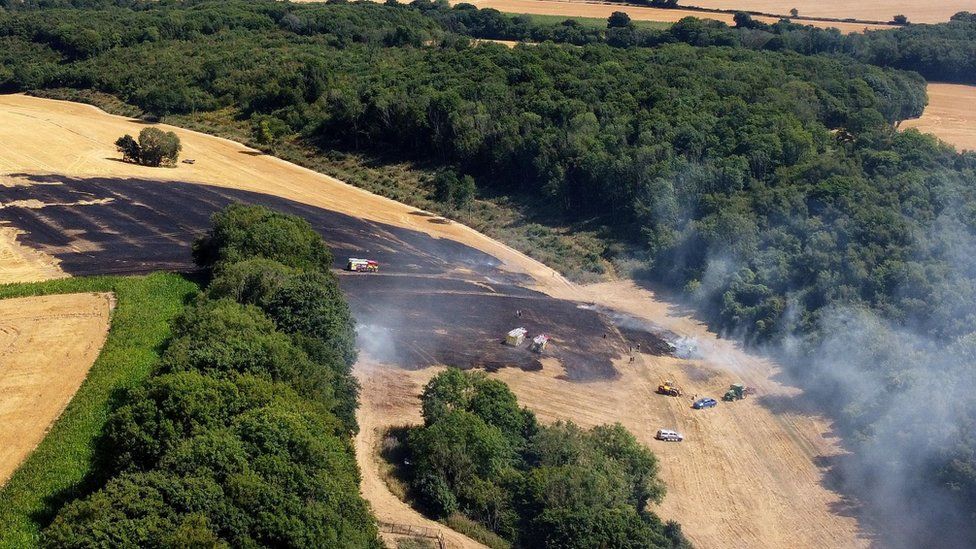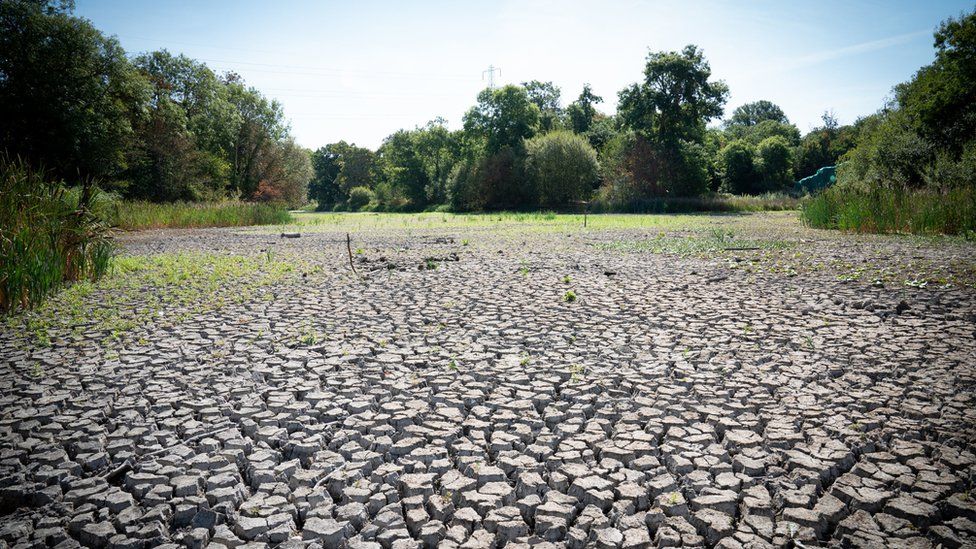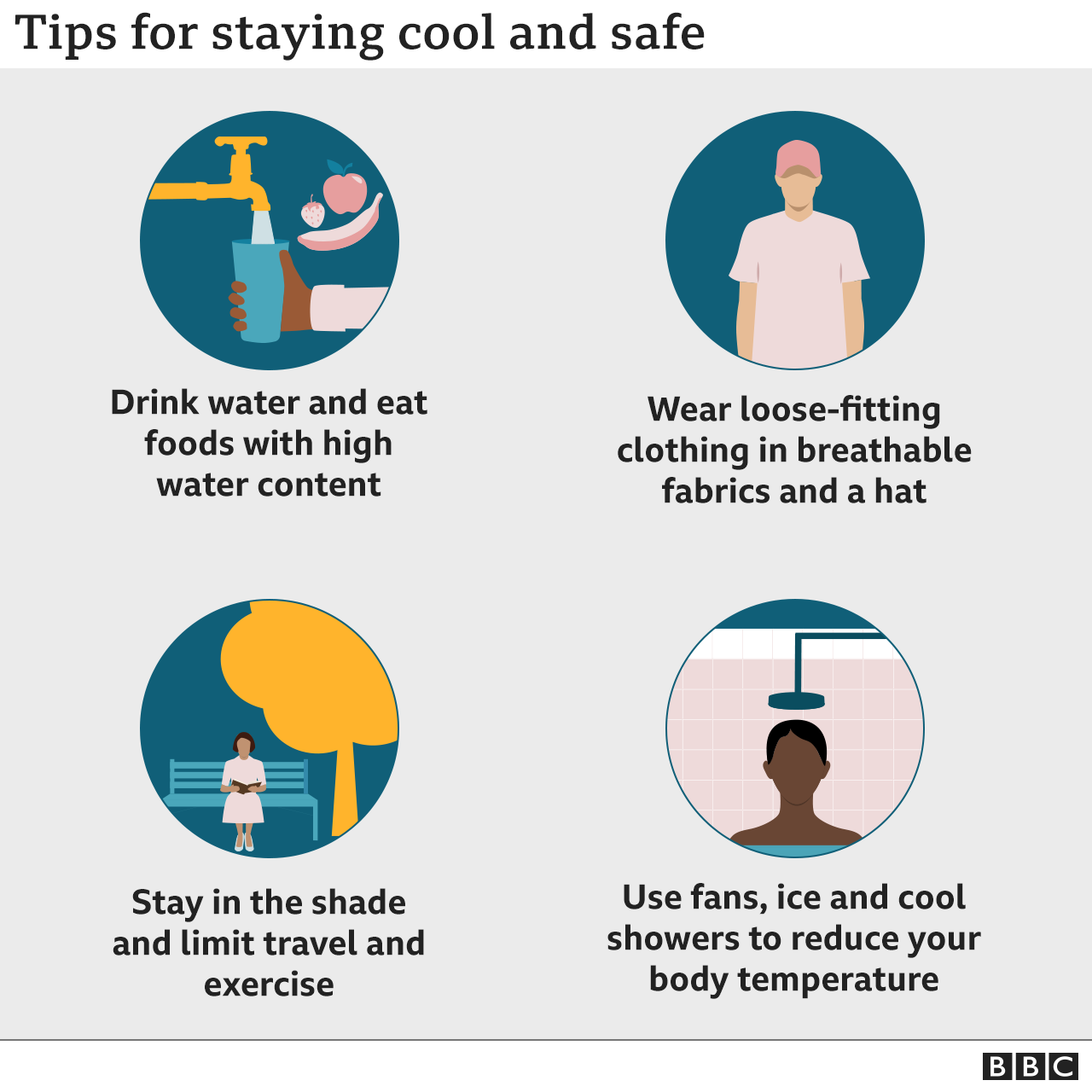 EPA
EPAThe Met Office has issued a four-day amber extreme heat warning, meaning vulnerable people's health could be impacted and travel could be disrupted.
The warning applies to southern and central England and parts of Wales from midnight on Thursday until Sunday.
Temperatures are set to reach up to 35C (95F) in some areas and Thames Water has become the latest water firm to announce hosepipe ban plans.
Meanwhile, a 14-year-old boy has died in a lake in Hertfordshire.
Emergency services were called to North Met Lake, off Cadmore Lane in Cheshunt, just after 17:00 BST on Monday, with his body recovered six hours later, police said.
The amber alert is the longest the Met Office has issued since it introduced the warning system in 2021 and is lower than the first-ever red warning in July, when temperatures exceeded 40C for the first time.
But the Met Office said while temperatures this week would remain below last month's record highs, this heatwave could last longer.
The Met Office warning is one of several alerts aimed at preparing the country for the heat:
- A level-three heat-health alert will apply from Tuesday to Sunday in central and southern England, the UK Health Security Agency (UKHSA) said. This "requires social and healthcare services to target specific actions at high-risk groups"
- A level-two alert has been issued for northern England
- The Met Office's fire severity index is "very high" for most of England and Wales and will reach "exceptional" for parts of England by the weekend. This assesses how severe a fire could become if one starts
While the warnings remain lower than those issued during last month's record temperatures, the UKHSA's Dr Agostinho Sousa emphasised that it was important vulnerable people, like the elderly who live alone or anyone with underlying health conditions, were "prepared for coping during the hot weather".
"The most important advice is to ensure they stay hydrated, keep cool and take steps to prevent their homes from overheating," he added.
Disabled people could be particularly affected by heat, and may suffer fatigue, difficulty regulating their body temperatures, or problems moving to cooler spots in the home.
"Family, friends and neighbours should check that disabled and older people have the support they need. We do this in cold weather but heat can be equally dangerous," Fazilet Hadi, from Disability Rights UK, said.
This video can not be played
To play this video you need to enable JavaScript in your browser.
England had its driest July this year since 1935, according to the Met Office, while south-east and central southern England had the driest month since records began in 1836.
Between the start of this year and 6 August, the south-east recorded 144 days with average rainfall of less than 0.5mm. Of those, 57 saw no rain at all.
Warnings of the threat posed by wildfires have been issued, with fire services urging people not to light bonfires or barbecues, or let off fireworks or sky lanterns.
Amid the warnings, around 70 firefighters battled a blaze over five hectares (12.36 acres) of grass and shrubland in Enfield, north London, while there have also been fires on the outskirts of Ipswich and near Reading.
The heatwave combined with months of dry weather have also led to increasing problems for farmers, with grass not growing and irrigation water running low cited as two key concerns.

Thames Water said it would be announcing restrictions on water use in response to forecasts of more hot and dry weather, with the exact timings to be confirmed later.
Hosepipe bans are already in force in Hampshire and on the Isle of Wight, and others are due to come into force in Kent, Sussex, Pembrokeshire, and Carmarthenshire.
The UK Centre for Ecology and Hydrology has warned river flows are set to remain exceptionally low in central, southern and eastern England until October.
River Action founder Charles Watson said called for the government to act to prevent an "ecological emergency".
"If the flows really slow down, the ecology of the rivers is being killed and, meanwhile, the concentration of the pollution that's all still there [will increase]," he said.
Christine Farnish, a former board member of water regulator Ofwat, told BBC Radio 4's PM programme water companies "need to get their houses in order" over leakage and said they had been "very slow" to wake up to the realities of climate change.
But Water UK's director of policy Stuart Colville said Ofwat figures showed companies were at the lowest ever levels of leakage on record.
He told PM the industry was doing "everything we can" to avoid restrictions on water use, including moving water between regions and changing where it was drawn from to reduce pressure on supply.
Met Office deputy chief meteorologist Dan Rudman said temperatures would be "rising day-on-day through this week" and were expected to peak at 35C on Friday and Saturday in some areas.
Any showers would be to the far north-west of the UK and would be short-lived in nature, he said, adding there would be "no relief for parched land" in the south.

A heatwave is defined as above average temperatures being reached for three days or more. Heatwaves are becoming more likely and more extreme because of human-induced climate change.
The world has already warmed by about 1.1C since the industrial era began, and temperatures will keep rising unless governments around the world make steep cuts to emissions.
We are living in the hottest period for 125,000 years, according to the UN's climate science body, the Intergovernmental Panel on Climate Change.


How is the hot weather affecting you? Share your experiences by emailing haveyoursay@bbc.co.uk.
Please include a contact number if you are willing to speak to a BBC journalist. You can also get in touch in the following ways:
- WhatsApp: +44 7756 165803
- Tweet: @BBC_HaveYourSay
- Upload pictures or video
- Please read our terms & conditions and privacy policy
If you are reading this page and can't see the form you will need to visit the mobile version of the BBC website to submit your question or comment or you can email us at HaveYourSay@bbc.co.uk. Please include your name, age and location with any submission.


- A CULTURE OF FEAR?: A closer look at £2bn 'punk' brewery business BrewDog
- FROM BOY TO MAN TO PRIME MINISTER: The story of Boris Johnson as told by those who know him best

https://news.google.com/__i/rss/rd/articles/CBMiJmh0dHBzOi8vd3d3LmJiYy5jby51ay9uZXdzL3VrLTYyNDcyOTI20gEqaHR0cHM6Ly93d3cuYmJjLmNvLnVrL25ld3MvdWstNjI0NzI5MjYuYW1w?oc=5
2022-08-09 18:28:23Z
1523117839
Tidak ada komentar:
Posting Komentar